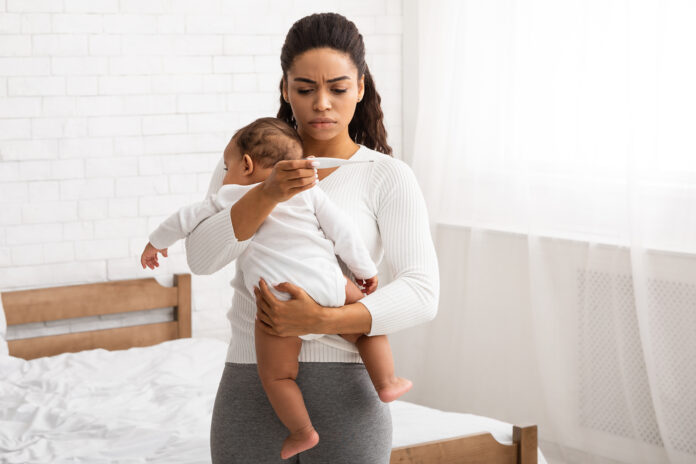While we may have reached a certain comfort level with some viruses in our lives, there is one virus that poses a particular danger to young children across the country: Respiratory Syncytial Virus. RSV infects two out of three babies by their first birthday. Many babies can recover from the viral infection with no complications, but for some, it can spread to the lungs and cause a more severe infection. In fact, RSV is the leading cause of hospitalization in babies under age 1.
There is no preventative treatment for RSV yet (scientists are working on it!), but it helps to learn more about this potentially serious virus. Here are a few surprising facts about RSV you may not have known. Talk to your doctor for more information.
1. It’s Hard to Tell the Difference Between RSV and a Cold at First
The first symptoms of RSV are usually mild and may include a runny nose, decreased appetite, coughing, sneezing and fever. And while those symptoms are present in nearly every childhood illness, the difference with RSV is that things can go downhill very quickly, especially with babies.
Kristina Deeter, pediatric intensivist and medical director at Pediatrix Critical Care and Hospitalists of Nevada, explains that there are two main symptoms that parents often miss: 1. Baby is breathing very fast; 2. Baby is having brief pauses in their breathing. “Any baby that is having trouble breathing or eating should be seen immediately so they can be assessed before things get worse,” she says.
2. Anyone Can Get RSV
RSV is commonly considered a virus that only affects babies and children, but the truth is, anyone can get RSV (and actually, nearly every human will). Most recover from the virus within a few weeks, but some people will be more at risk for complications, including children under the age of 2, adults over the age of 65 and anyone who has a medical condition or suppressed immune system.
“This risk is increased in premature babies, babies with conditions that affect the lungs such as bronchopulmonary dysplasia, babies with congenital heart disease and babies with Down syndrome,” adds Rachel Buck, DO, Phoenix Children’s Pediatrics in Paradise Valley, Arizona. Additionally, having smoke present in the home increases the risk of complications from RSV.
3. Even Healthy Babies Can Get Very Sick from RSV
While the risk of serious complications from RSV is greater in babies with other conditions, it’s also important to understand that RSV does not discriminate. In fact, the majority of hospitalizations from RSV are babies who were born with no underlying health concerns. Dr. Buck explains that RSV is a lower respiratory infection that affects the bronchioles (the small airways in the lungs), and because babies’ airways are so small, the virus can become more dangerous. So be on the watch for symptoms in baby that could include difficulty breathing and eating, dehydration and pauses in their breathing.
4. You Can Get RSV More Than Once
Unfortunately, just because baby has had RSV once, doesn’t necessarily mean that they won’t get it again. RSV, like many other viruses, can strike more than once. Fortunately, however, Victoria Regan, MD, a pediatrician with Children’s Memorial Hermann in Houston, says that if your baby does get infected twice, subsequent infections are likely to be more mild than the first round.
5. Most Cases of RSV Can be Treated at Home
The good news is, while RSV can be severe for certain groups, Dr. Regan says most cases of RSV can be successfully treated at home with strategies like making sure your baby is hydrated, using a cool-mist humidifier, clearing your baby’s nose with saline and a suction device and using over-the-counter pain relievers and fever reducers as appropriate. She notes that less than 3 percent of babies will require hospitalization for RSV.
6. Breast Milk Has Antibodies Against RSV
We all know breast milk can be liquid gold in many ways, and according to Dr. Regan, breast milk also contains a special antibody that can specifically help fight RSV—so if you’re a nursing parent, keep offering your baby all the breast milk they want!
7. You Can Help Protect Your Baby With One Simple Step
As we learn more about the serious symptoms of RSV, Patricia N. Whitley-Williams, MD, immediate past president of the National Foundation for Infectious Diseases (NFID), explains that handwashing is one of the most important things you can do to help prevent RSV in your home.
Other ways you can help prevent the spread of RSV include:
- Cover coughs and sneezes (looking at you, older siblings!).
- Avoid letting others have close contact with baby when they are sick, such as kissing baby.
- Don’t touch faces with unwashed hands.
- Clean frequently touched surfaces, like phones and doorknobs.
- Talk to baby’s healthcare professional for additional information about RSV.
As parents, it can be so challenging to navigate sickness with our kids, especially in light of the past two years. But the most important thing to remember is that you don’t have to make those decisions alone—finding a trusted physician you can turn to when you have questions makes all the difference. “Parents are always the best judge, and we as pediatricians rely on them to alert us if their child appears ill,” says Robin Jacobson, MD, medical director for pediatrics at NYU Langone Medical Associates. In other words? You know your child best, so don’t hesitate to call your doctor or seek medical attention if you think something is wrong.
Article reposted from TheBump.com.






